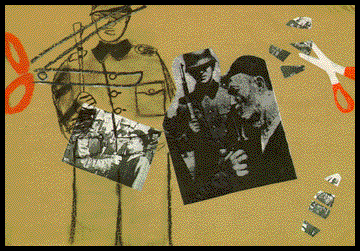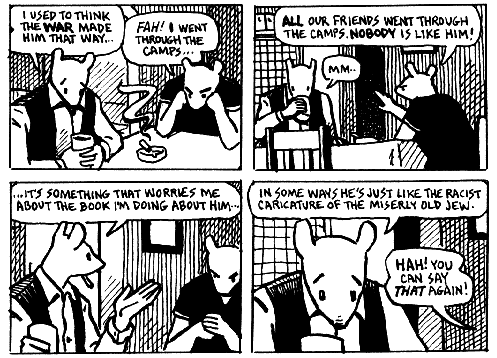
The "Saved"
The Effects of the Holocaust on Survivors

In MAUS the reader gets a sense of why Vladek is one of the men that Primo Levi calls "the saved." The only distinction that Levi says exists between men in the camps is those who were "saved" and those who were "drowned." The distinctions between good and evil lost their relevance and definition for the people in the camps; men and women who could be resourceful and survive had to do so while passively watching others die around them. "Saved" people were niether wholly good nor bad; rather they learned how to survive in the camps which forced people to be, as Levi says, "desperately and ferociously alone."
Even before Vladek is sent to Auschwitz, he learns to be one of the saved by being resourceful in the ghettos. Because he and Anja are very wealthy, he is able to buy them time away from the camps by paying people to take them in and help them hide from the Nazi's. The skills of bargaining and manipulation he learns on the streets in the days and months before the camp prepare him to look out for himself and his wife inside Auschwitz. His skills, along with incredible luck, help Vladek and Anja survive the horrors of the camp and return to the world where people are more than "drowned or saved."
In her testimony about her experiences in the Nazi camps, Helen L. says of survival, "And survival. And you'd be surprised, a person wants to live so badly, that you never think about it on a daily routine, you know, thank god this morning I woke up and I'm on my feet. You don't really think about it as much except when it is you're biggest gift from God that you did wake up this morning and that you did survive the day. Living is something you really want very badly, under any circumstances." Helen, a survivor and hence one of the saved, had the will to live through the pain and suffering of her time in the camp. She held on to her life as tightly as she could and somehow found the luck to help her through. However, as one of the saved, Helen had to disregard the lives of many others; in her narrative she describes how she would have to take the clothes from the bodies of the dead to replace her worn garments. She describes another instance in which she and her sister are covered in blood during an attack; their only questions to each other are whether it is their blood and if it hurts. Unscathed in this attack, they thank God for sparing them and continue to attempt to survive.
Later in her narrative, Helen says of the liberation: "And then our problems began. We were liberated by the Russians." Though her statement refers to the torture she and her sister endured under Russian control, the very same sentiment appears in several other survivor testimonies refferring not to the horrors of torture that were soon to come but rather to the difficulty that laid ahead psychologically. Upon liberation, many survivors realized that the lengths that were forced to go to in order to survive would not be accepted in the outside world; they realized that what they had been forced to live through and forced to do for survival would be considered barbaric and possibly evil by the outside world.
The experience in the camps completely changed the mindsets of those who were dedicated to survival; those who did survive faced even larger problems upon their liberation because not only would they have to deal with the fact that they had abandoned the ethics of the outside world almost completely, but also deal with the guilt of survival. Those who were liberated had survived the torture that over six million others had succumbed to. Those who survived were not necessarily those who had the most to live for or even the most pure of spirit. The survivors were strong of will and blessed with luck. The psychological difficulty of dealing with such things has manifested itself in different ways among the different survivors.
Walter F., when asked about the psychological effects of the Holocaust on him responds: "It may be, it may be, I'm my own psychiatrist probably have a fool for a client, it may be that I had built a capsule around me. And I'm not looking too deep into me. And that may be why I was able to survive, why I was able to make it and think about it and not shy away from the thought." Walter tries not to let the memories affect him too much. Walter is like Vladek, who shows little emotion while relating his tale and whose emotion and guilt over the suicide of his wife remains hidden, revealed only through Art's underground comic. These are the sort of survivors who do not forget, for they understand the importance of remembering, but who do not dwell. They learned in the camps that to think on death and such sadness too long could send you into the depths with the drowned--they have not forgotten this lesson and live their lives accordingly.
Not all survivors truly survived the Holocaust. Anja Spiegelman committed suicide twenty years after her liberation. Primo Levi, the talented writer that survived and gave the world incredible insight into the camps and their effects, also took his own life seven years ago. The inability of some survivors to continue living in the world of regular society demonstrates the depth of the psychological turmoil ingrained in the minds of many survivors by their experiences in the camps. These people allowed the guilt of survival to destroy their souls, dragging them into the world of the drowned.
Because of the severe psychological damage imposed upon those who survived the Holocaust, their reintegration into society was very difficult. Even Vladek, who tries to keep the events of his past from affecting him shows the scars of his experience:

Art worries about Vladek coming across as a "miserly old Jew" because of his tendencies to worry about how many matches are left or that they won't let him return a half empty box of cereal to the grocery store. Vladek gained these tendencies in the war--he learned that everything is of value and that to waste would be to starve and die. Because these habits so ingrained themselves in his mindset, he displays his scars from the Holocaust in idiosynchratic tendencies rather than through depression or suicide. The above frames display the frustration that Mala feels toward these idiosynchracies as a survivor who is dealing with her scars in different ways--like obsessing over how much money she will inherit when Vladek dies. The frames also display the problem of the generation gap between Art and Vladek--and the tension that many children of survivors feel toward their parents.
The ways in which survivors deal with the experiences of the camps varies dramatically. Though all survivors share a common bond, that bond is one of pain that they all want to forget or escape. They share the desire to pass their stories on the safeguard the future against another Holocaust; however, they do not share the means to do this. Some survivors feel the need to tell their tales and bear witness to the events they experienced while others will only speak about the events if prompted.
The Jewish community was torn apart by the Holocaust because of the mass genocide and displacement of European Jews, but also in part because of the emotional difficulty faced by the survivors of the Holocaust as they integrated back into society. The survivors all have different emotional issues and face different demons making their reentrance into the community and the world extremely challenging.